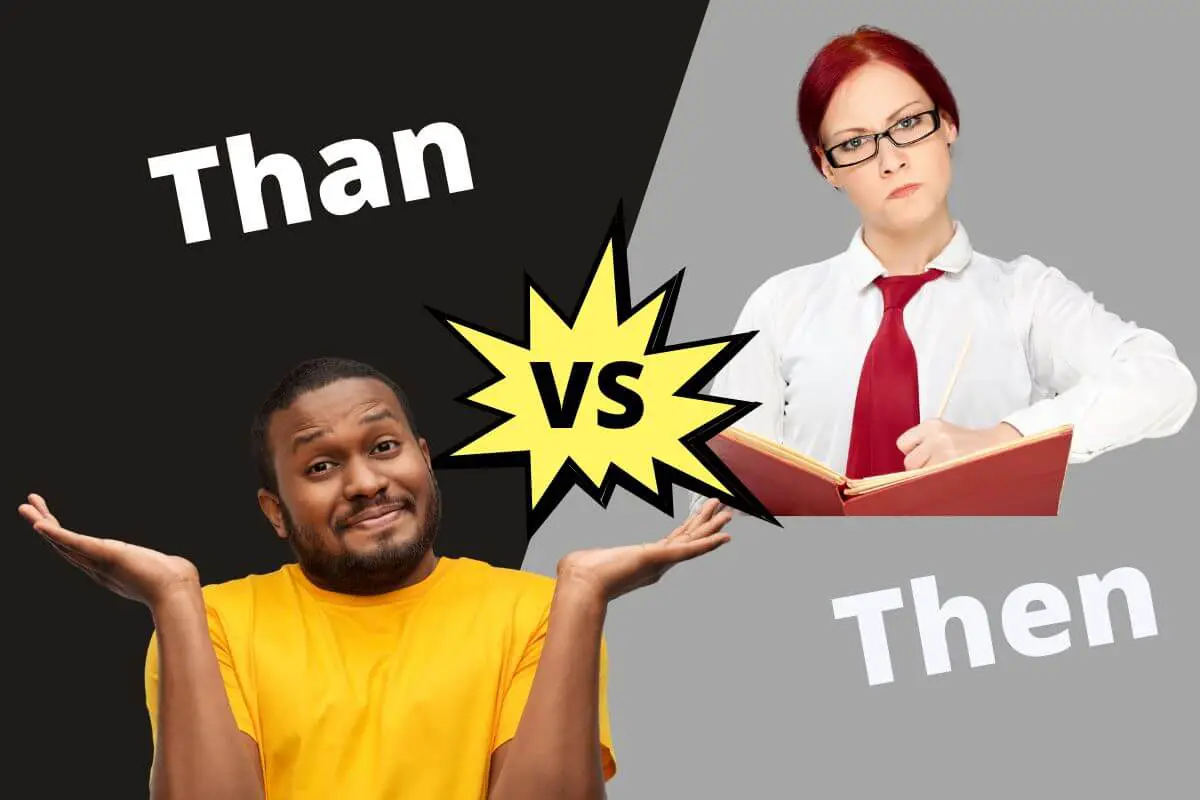The main difference between than and then is that than is used for comparisons, and then is used to indicate time.
These two words have similar pronunciations, but they’re entirely different in terms of meaning and usage.
Table of Contents
Difference Between Than and Then
| Than | vs | Then |
| The term “than” is used in comparative sentences, to compare two things | Meaning | “Then” is an action word, which refers to the time |
| Conjunction or Preposition | Parts Of Speech | Adverb, adjective, and noun |
| dan | Pronunciation | den |
| Middle of the sentence | Position | Beginning or end of the sentence |
| “Than” is used to indicate the second element in comparison | Used For | “Then” is used to indicate the second part of the sentence |
What Does Than Mean?
The term than is a comparative term. It can be used as a conjunction and preposition to compare two entities, units, or individuals.
Than is often placed in a sentence after a comparative adjective and adverb. It’s used in phrases such as rougher than and harder than.
It usually follows words such as rather, more, and less. The usage of the word than is very specific. It’s difficult to replace it in a sentence with another word without changing the entire meaning.
Examples of Than
Here are a few examples of the term than.
- Kiran is taller, prettier, and better dressed than her sister, but her sister is smarter than her.
- This old school had more students than the new one.
- I would rather have been on vacation in Dubai than working over the holidays in York City.
The term than is also used in various idioms and proverbs, such as:
- Blood is thicker than water.
- Better late than never.
- Better you than me.
- The pen is mightier than the sword.
- Truth is stranger than fiction.

What Does Then Mean?
The word then functions as an adverb, noun, and adjective to refer to multiple things.
When used as an adverb, it refers to:
- At that time
- Next in order of place or time
- At the same time
- Soon afterward
- In addition
- As a consequence
When used as an adjective, it’s defined as being such, existing or being at the time indicated. When used as a noun, then means that time. It also appears in idioms and phrases, such as just then, until then, and even then, etc.
Examples of Then
Here are a few examples of the word then.
- I eat my breakfast, and then I go to school.
- If my bike doesn’t start, then I will be in trouble.
- Slices of bread were cheaper back then.
- I poured a glass of milk and then sat down to eat.
- First I’ll drink my apple juice, then eat my sandwich.
Then is not commonly used in idioms and phrases; however, here are a few examples.
- Every now and then
- And then some
- Then again
- Just then
- Until then

Than vs. Then – Key Differences
Meaning
The term than is used in comparative sentences to compare two things. In contrast, then is an action word that refers to time.
Part of Speech
Than is used as a conjunction or preposition, while then is used as an adverb, adjective, and noun.
Pronunciation
Than is pronounced as dan, while then is pronounced as den.
Position
Than is positioned in the middle of the sentence, while then is positioned at the beginning or end.
Used For
Than indicates the second element in comparison, while then indicates the second part of the sentence.
The bottom line is that then and than are homophones that sound similar and share many similar characteristics. However, they have different personalities and meanings.
While than is used as a conjunction or preposition to refer to a comparison between two entities, then is used as an adverb or adjective. It is used to indicate time or consequences.
Remember the Difference Between Than and Then
The best way to remember the difference between then and than is to link then with time and order. On the other hand, link than to any form of comparison.
Also, you can focus on the letters “a” and “e.” Than is used for comparison, and both than and comparison have the letter “a” in their spellings. Then is used for a time, and both then and time have the letter “e” in their spellings.
If you’ve enjoyed this article, check out our post comparing to versus too.

